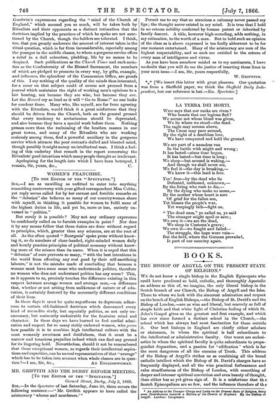WOMEN'S FRANCHISE.
[To THE EDITOR OF THE " SPECTATOR."] SIR,—I am as unwilling as unfitted to enter into anything resembling controversy with your gifted correspondent Miss Cobbe, yet reply seems called for by her earnest and forcible remarks on the " delusion" she believes so many of our countrywomen share with myself, in thinking it possible for women to fulfil some of the highest duties in life, and yet be, more or less, entirely un- versed in " politics."
But surely it is possible? May not any ordinary experience be confidently called on to furnish examples in point? Nor does it by any means follow that these duties are done without regard to principles, which, greater than any sciences, are at the root of all. As the often quoted " Bourgeois" spoke prose without know- ing it, so do numbers of clear-headed, right-minded women daily and hourly practise principles of political economy without know- ing more of the science than its name. When it is urged that this "delusion" of ours prevents so many, " with the best intentions in the world from effecting any real good by their self-sacrificing labours," is not the mistake made of concluding that because a woman must have some sense who understands politics, therefore no woman who does not understand politics has any sense? This, as it appears to us, precisely touches the difference existing in this respect between average women and average men,—a difference that, whether or not arising from unlikeness of nature or of edu- cation, is certainly fostered by the necessarily different conditions of their lives.
In these days it must be quite superfluous to deprecate adher-
ence to certain old-fashioned doctrines which denounced every kind of recondite study, but especially politics, as not only un- necessary, but eminently undesirable for the feminine mind and character. In these days we have learned to feel cordial admi- ration and respect for so many richly endowed women, who prove how possible it is to combine high intellectual culture with the most womanly sweetness and dutifulness, that it must be a narrow and tenacious prejudice indeed which can find any ground for its lingering hold. Nevertheless, should it not be remembered that these exceptional women, as regards their intellectual aspira- tions and capacities, can be no real representatives of that "average" which has to be taken into account when whole classes are in ques-






























 Previous page
Previous page